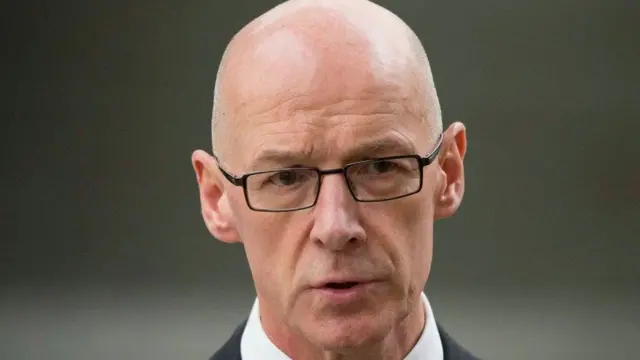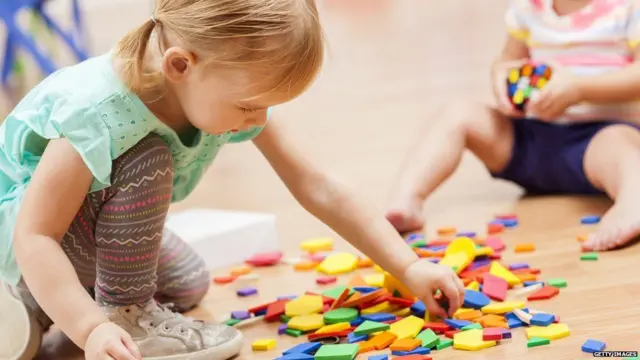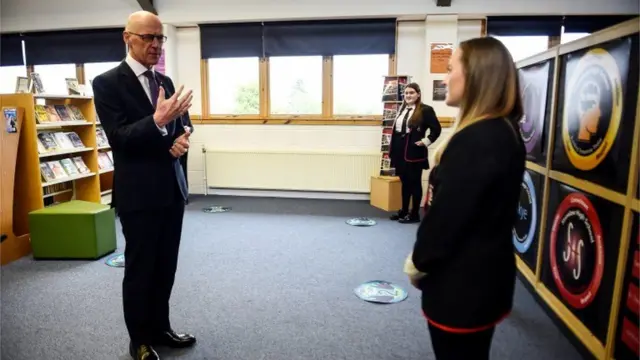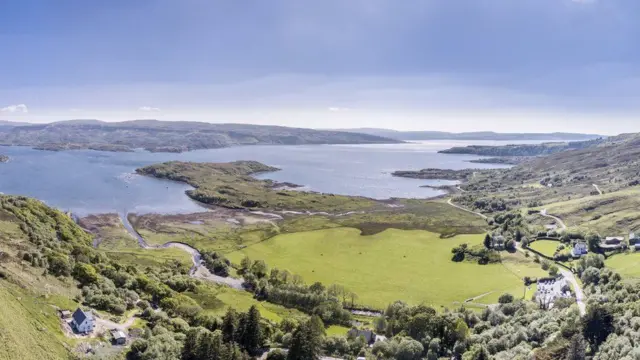Queen leads tributes for Captain Sir Tom Moorepublished at 17:47 GMT 3 February 2021
Buckingham Palace said the Queen recognised "the inspiration he provided for the whole nation".
Read MoreNicola Sturgeon says although progress is being made on controlling the virus, restrictions will remain for "at least" the rest of the month
Pupils will begin a phased return to school from 22 February with the youngest going back to the classroom first
Senior pupils who have "practical" assignments to complete will be allowed to return on a "part-time" basis, with no more than 8% of the school roll attending "at any one time"
A "managed quarantine" requirement is to be introduced for anyone arriving directly into Scotland, regardless of which country they have come from
Ms Sturgeon says it is reasonable to ask questions about Scotland's vaccination programme as compared to other parts of the UK
However, she points out that "we believe we are achieving a higher uptake of the jab than elsewhere"
National clinical director Jason Leitch says Scotland needs to speed up its vaccination programme
The number of patients in hospital falls by 19 to 1,939 with 143 of that number in ICU. A further 69 deaths have been reported
BBC Scotland News
Buckingham Palace said the Queen recognised "the inspiration he provided for the whole nation".
Read MoreThe World War Two veteran raised millions for NHS charities and is called a "true hero" by the PM.
Read MoreScotland's daily vaccinations hit a new high but they are still some way behind the other UK nations.
Read MoreAllow X content?
This article contains content provided by X. We ask for your permission before anything is loaded, as they may be using cookies and other technologies. You may want to read X’s cookie policy, external and privacy policy, external before accepting. To view this content choose ‘accept and continue’.
That's all from us here on the live page. Have a good night, take care and stay safe.
Allow X content?
This article contains content provided by X. We ask for your permission before anything is loaded, as they may be using cookies and other technologies. You may want to read X’s cookie policy, external and privacy policy, external before accepting. To view this content choose ‘accept and continue’.
 Glenn Campbell
Glenn Campbell
BBC Scotland Political Editor
The current stay-at-home lockdown, like the last one, is a long slog.
It will last what’s left of the winter.
But as we move into spring, change is coming.
Plans to reopen nurseries and schools from 22 February for the youngest children will not only restore their full time education but will allow some parents to resume work.
However, the phased return of schools could add to the burden some families have to carry.
If, for instance, you have a young child to get to school and an older pupil to organise for online learning at home, that could be harder to manage than either having both at home or both in school.
It’s not clear how quickly full-time schooling will resume for all age groups.
It will be another fortnight before the first minister sets out how wider restrictions might be eased from the beginning of March.
It is already clear that process will be gradual and that some measures such as social distancing, wearing face-coverings and avoiding international travel will not be lifted anytime soon.
Five things you need to know about the coronavirus pandemic this Tuesday evening.
Read MoreThe Scottish Retail Consortium has called for a national strategy to support the industry.
Read More Jamie McIvor
Jamie McIvor
BBC Scotland education correspondent
The SSTA teachers' union says it is very worried by the first minister’s statement.
General secretary Seamus Searson said: “It shows a real lack of understanding of how teachers are feeling at the moment”
Mr Searson said there’d been no discussion with SSTA (or other unions) prior to the announcement and stressed problems that will be created in secondary schools.
He highlighted the position of vulnerable and shielding staff and their involvement in pupils returning. And said teachers with child caring responsibilities have not been considered.
Mr Searson said: “There will be a lot of frightened and worried teachers as a consequence of the FM statement especially as everybody is in lockdown until the end of February. Teachers are not allowed the protections that everybody else has. “
 Drivetime with John Beattie
Drivetime with John Beattie
BBC Radio Scotland
 Image source, PA Media
Image source, PA MediaJohn Swinney, the education secretary and deputy first minister, will be speaking to John Beattie on BBC Radio Scotland shortly.
 Drivetime with John Beattie
Drivetime with John Beattie
BBC Radio Scotland
Sam, a fifth year, will be allowed to go back into school for some coursework, but says they will still need to wear masks, or do the work outside because of social distancing.
"It's good to see we're making some progress, but young people are really suffering with their mental health," he says. "We are feeling lonely and like we have been put to the side. It has been really difficult."
Cayden, a third year pupil, says it is "quite upsetting" because he has exams next year and feels he is "missing out on everything I need to learn".
 Drivetime with John Beattie
Drivetime with John Beattie
BBC Radio Scotland
Erin, a sixth year pupil who is studying advanced Highers this year, says it is "very annoying" to have to continue with home learning for the time being.
"Not being able to work collaboratively or see my peers is taking a toll," she told BBC Scotland's Drivetime. "It is getting really difficult to be in the house and not seeing my friends for a long time.
"When I'm working I prefer to have someone my own age to talk to rather than having to to email my teacher and say I'm struggling."
Remembering Captain Sir Tom Moore
 Image source, Getty Images
Image source, Getty ImagesPurnima Tanuku, chief executive of the National Day Nurseries Association in Scotland, has welcomed the first minister's announcement about a full-time return of early learning and childcare for all children below school age.
"This will come as a huge relief to nurseries and parents across Scotland," she said.
"Some nurseries have been unable to open at all because of small numbers of children eligible to attend; the rest have been open only for key worker and vulnerable children.
“Nurseries are crucial for children’s development and early learning. Families need them for stability and to enable parents to work. It’s good to have two weeks’ notice for settings that are not already open to get ready."
Ms Tanuku is also pleased that the extension of asymptomatic testing will include private and voluntary early learning and childcare settings.
“Children and staff safety is the number one priority for all nurseries," she added.
Allow X content?
This article contains content provided by X. We ask for your permission before anything is loaded, as they may be using cookies and other technologies. You may want to read X’s cookie policy, external and privacy policy, external before accepting. To view this content choose ‘accept and continue’.
So Scotland's youngest pupils are likely to return to the classroom full time from 22 February as schools start a phased reopening.
There is plenty reaction to the first minister's statement coming up in the next hour on BBC Radio Scotland's Drivetime:
As ever you can listen to it all here on the live page.
 Image source, Reuters
Image source, ReutersThe education secretary visited a school in Rutherglen on results day last August
 Drivetime with John Beattie
Drivetime with John Beattie
BBC Radio Scotland
Suzanne, who has a six-year-old daughter, told BBC Scotland's Drivetime programme she is “absolutely ecstatic” that early primary pupils could return to school from 22 February.
"Due to the nature of my job, I am taking very sensitive calls every day, so it will make a big difference," she said.
"Monica’s primary has been absolutely amazing and accommodated me when they could. But it will be great for her to be back in school because she needs her education."
Michael, who has two children - one in primary, one in secondary - said it is "good to see something’s moving" and "at least we know it’s coming".
"My daughter was listening to the announcement with me and was really upset she wasn’t going back," he told Drivetime.
"But it didn't last any more than a few minutes. She has completely forgotten about it now and gone back to her work!"
Allow X content?
This article contains content provided by X. We ask for your permission before anything is loaded, as they may be using cookies and other technologies. You may want to read X’s cookie policy, external and privacy policy, external before accepting. To view this content choose ‘accept and continue’.
 Image source, Getty Images
Image source, Getty ImagesArdnamurchan is among the areas highlighted in a council report
Pupils in some rural parts of the Highlands face challenges to learning at home due to poor or "non-existent" broadband or mobile phone coverage.
A Highland Council report said affected areas included Foyers and Dores, parts of Caithness, Black Isle and Skye and Ardnamurchan and Knoydart peninsulas.
Children on Canna, Eigg, Rum and Muck also face similar challenges.
The report said local schools were making sure pupils had access to learning resources.
It said some families were also paying for satellite contracts to overcome connection issues.
Read more here.
Allow X content?
This article contains content provided by X. We ask for your permission before anything is loaded, as they may be using cookies and other technologies. You may want to read X’s cookie policy, external and privacy policy, external before accepting. To view this content choose ‘accept and continue’.